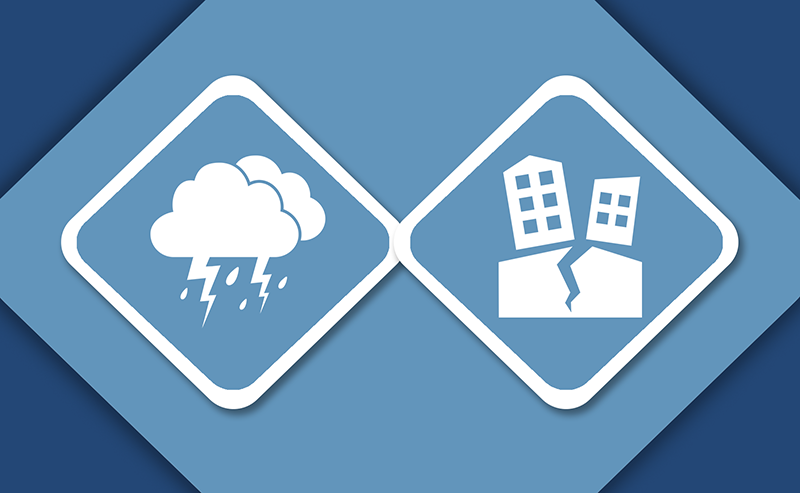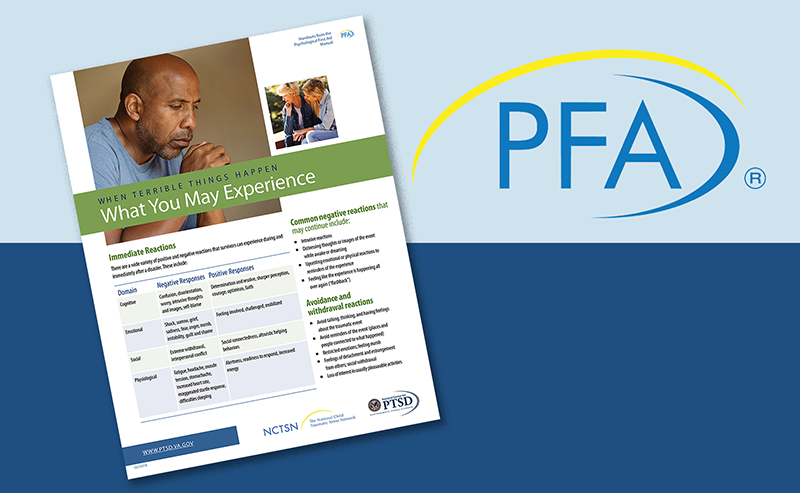PTSD: National Center for PTSD
What to Expect in the Wake of Disaster Events
What to Expect in the Wake of Disaster Events
Disaster events, which include natural or human-caused disasters, mass violence, and public health emergencies, affect many people in different ways. People may get hurt or die and a community may be left with great damage. Learn about common reactions and types of stress that can continue after such events as well as how support may come from shared experiences.
Reading time: minutes
Disasters may be natural—including fires, hurricanes, ice or snowstorms, floods, landslides, and droughts. Other disasters, such as plane crashes, mining or industrial accidents, and chemical spills, are caused by human error, negligence, or mechanical failure. Disaster events also include mass violence (like terrorist acts, public shootings, or bombings) and public health emergencies (like disease outbreaks, chemical spills, or radiation emergencies). No matter the cause, disaster events can have a deeply painful impact on people who experience them, their loved ones, and communities.
Disaster events cause social and community disruption. Transportation, food and water supplies, and communications can be affected. Property damage may be widespread, depending on the specific event. People may lose jobs located in the affected communities or be unable to get to their places of employment.
At the same time, support also comes from going through a shared event. Those affected by disaster events are or may become connected and help each other cope. During the event itself we hear stories of people putting their lives at risk to help strangers. Following the event, people are surrounded by others who understand as they are moving through the event at the same time. Support can also come from the public through fundraising efforts, volunteer help, and practical assistance by agencies like FEMA.
Common Reactions
Given the damage or disruption that can occur after disaster events, it is not surprising that almost everyone has reactions early. Initial relief to be alive may be followed by distress, fear, or anger. People may find it hard to stop thinking about the situation, have trouble sleeping, or feel keyed up or on edge. For most people those reactions will lessen over the first few weeks after the event. For those who lost a loved one, were injured, or were forced to relocate, reactions after the event may be more intense and longer lasting.
Ongoing Stressors
Following disaster events, there may be many ongoing stressors, or challenges that create stress. Stressors can make it difficult to get on with life. For example, depending on the situation:
- Days or weeks may pass before evacuees can get back to their homes to assess damage.
- Rebuilding takes money, time, materials, and workers—all of which can be in short supply.
- Families may take in relatives while they look for other housing, which can be stressful for everyone.
- People may be out of work if their employers are rebuilding or if they cannot make it to their jobs.
- Parents may have to homeschool or enroll children in new schools if the family is forced to quarantine or relocate.
- People may be frustrated or angry with the way recovery efforts are being handled.
- New physical health problems may need attention and pre-existing health problems can be made worse by stress.
- People may have to shelter in place, perhaps for long periods.
- In a chemical spill or radiation emergency, health effects might only emerge later.
The same type of event may occur many times in a person's life. For example, people who remain in a community that is prone to fires or live in "hurricane alley" have a chance of experiencing the same disaster many times. Those who live in areas where the rate of community violence is high may experience multiple mass violence events. A strong connection to place can be both an asset and a vulnerability in someone who lives in a community that is prone to disaster events. Long after danger has passed, everyday sights, sounds, and events may serve as regular reminders of the event. For example, the sound of fire trucks, police cars, high winds, or thunderstorms can serve as regular reminders of memories well into the future.
Moving Forward
Learn more about coping with the impact of disasters, mass violence, and public health emergencies: Self-Care After Disaster Events.
You May Also Be Interested In


























